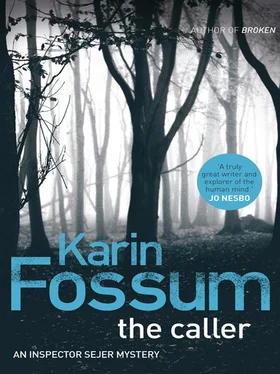‘Arnesen,’ he said. ‘From Memento.’
‘Arnesen?’
‘I’m from Memento,’ he repeated. ‘The funeral home. Ingemar Arnesen.’
Astrid began to tremble. She stared at the road, wondering whether the neighbours could see the car. What about Helge? Had he reached the window — could he see everything that was happening? She leaned against the door frame for support.
‘But what are you doing here?’ she whispered, her mouth dry.
Ingemar Arnesen raised an eyebrow. For the first time, he suspected that something might be different this time, though nothing he couldn’t handle with dignity. He remained calm.
‘I was called,’ he explained, ‘to pick up Helge Landmark.’ He looked directly into her eyes. His irises were large and green.
Then it struck Astrid. She grasped the door frame and stared at him wide-eyed. ‘Helge Landmark isn’t dead. He’s sitting by the window watching us as we speak.’
Arnesen closed his eyes. The whirling thoughts in his head became visible as twitches to his mouth, and Astrid felt sympathy for him.
‘Who called you?’ she said.
He straightened up, and his eyes darted towards the window, then back to the black car. ‘The doctor.’
‘The doctor?’
‘Dr Mikkelsen from Sandberg Medical Centre. Helge Landmark’s doctor. He reported the death two hours ago.’
She shook her head uncomprehendingly. ‘We don’t know a Dr Mikkelsen. Helge’s doctor’s called Dr Onstad. Martin Onstad. At the Central Hospital.’ She stared into the open car, and was terrified. ‘Somebody’s playing a trick on us.’
‘It looks that way,’ Arnesen said.
‘But who is Dr Mikkelsen? Is it a doctor you know?’
Arnesen seemed lost. She noticed the crease of his trousers, sharp as a knife. Newly polished black shoes. Snow-white shirt. ‘Many doctors call us,’ he said miserably. ‘There are always new doctors, and then the locums — it’s impossible to know every name. But he sent me here. To this address.’ He shrugged. ‘Helge Landmark. Is he your husband?’
‘He’s sick,’ Astrid whispered.
She flinched, because the door to the passenger side of the black car suddenly opened, and a younger man — also in a black suit — stepped on to the gravel. Of course there are two of them, she thought, for carrying the body. She looked nervously at the window, but the reflection in the glass made it impossible to see anything.
The younger man neared the steps. He too greeted Astrid with a respectful bow. ‘Is this the wrong address?’ he asked, a hint of dread in his young face.
‘That would be safe to say,’ Arnesen said gravely. ‘This is a mistake on every conceivable level.’
‘But what did he say?’ Astrid asked. ‘The man who called himself Dr Mikkelsen.’
Arnesen tried to recall. ‘He was rather curt, and maybe a little animated. He sounded quite young, so I thought maybe he’d just qualified. He didn’t say that much, just gave me the address. And the name, of course. He said Landmark had been sick for a long time, and that his death was expected. I asked him for the certificate. If he could send it to us by post, and he said, “Yes, I’ll send it by post.”’
‘The certificate?’
‘Death certificate. Naturally, we’ve got to have it before we can start doing our job. The doctors often send it by post.’
Astrid summoned her courage to return to the house.
‘We’ve got to report this,’ Arnesen said. ‘Without delay.’
‘Do that for me,’ she pleaded. ‘I must return to Helge.’
Helge sat at the window.
His face was bathed in evening light, paler than ever.
The car from the funeral home had started its engine, but it remained parked in the driveway. The motor was barely audible, just a weak hum.
‘What are they driving?’ Helge asked.
Astrid looked at him sadly. ‘Someone called them here,’ she said. ‘But it was just a prank. We’re going to report it. You know, there’s been a lot of that going on recently — with fake obituaries in the newspaper and such. And that episode with the baby out in Bjerketun, remember? It’s probably the same people. Some boys, maybe, having a laugh.’
She turned away. Without knowing why, she imagined that he blamed her. As if she was the one who’d played this cruel trick. Now we’ll cross the line, she thought, now death has entered the house. This guest we’ve never dared talk about.
Helge gathered himself to speak. She saw how he struggled.
‘I suppose I could’ve gone with them,’ he said. ‘What difference would it make?’
He sniffed and laughed. The laughter was so bitter that Astrid was utterly racked with anguish. She knew instantly what he needed, and what she ought to do: run to him with assurances that she still needed him. Which was true. She needed Helge Landmark, the aeroplane mechanic, the tall, broad-shouldered man she’d met at the age of nineteen and whom she later married. But she didn’t need this sad man in the wheelchair. Illness had sneaked in everywhere; it was in the walls and in every room. A commode chair in the bathroom. A bedpan in the bedroom. A pill organiser in the kitchen. The last thing she saw before going to bed at night was his wheelchair. The big wheel and its grey rubber filled her field of vision, reminded her of a turbine sucking her in and throwing her around at great speed, until she didn’t know which way was up and which was down. Then she awoke to the same wheel in the morning.
The car was still there.
‘Why don’t they drive off?’ she said anxiously.
‘He’s talking on his mobile,’ Helge said. ‘He’s probably calling the police.’ He pressed his face to the glass to see. ‘Look at that car. It’s a limousine.’
They stared at the driveway.
‘Go and get them,’ Helge said suddenly.
Astrid was taken aback. ‘What?’
‘Get them. There’s something I want to say.’
‘But Helge,’ she pleaded, ‘they couldn’t help it. Someone called them.’
He looked at her imploringly, and grabbed her arm with a clumsy hand. Rarely did she see this type of engagement in him; it was as though he had been brought to life for the first time in months. ‘Please do what I say. You have good legs, after all. Hurry before they leave.’
Astrid ran to the steps. She reached the car just as it was about to drive off. The men looked at her curiously through the glass, the window slowly sliding down. ‘He wants to talk to you,’ she said in despair. ‘Can you come in? I’m sorry to disturb you, but this is very difficult.’
The men from Memento hesitated. The thought of seeing Helge Landmark face to face made them highly uncomfortable. He had something to say, and they didn’t feel they had the courage to hear it. But they did as Astrid requested, stepping out of the car and following her inside. They stood in the middle of the lounge and saw Helge Landmark in his wheelchair.
‘Good evening.’
Helge nodded, and they nodded in return. He pointed at the window with a pale hand. ‘Sorry for delaying you,’ he said. ‘But I’m interested in the car.’
The men looked at him uncertainly while they waited for him to continue.
‘I mean,’ Helge said, ‘that’s one hell of a car.’
Now they couldn’t help but smile.
‘It is,’ said Ingemar Arnesen.
Helge continued to study the limousine through the window. He put a hand in his matted hair. ‘Have you had it long?’
‘Since May.’
Helge looked at the other man. He was quite young, and this situation he’d landed in had flushed his cheeks red. ‘What is your name?’ he asked gruffly.
‘Knoop,’ he blurted out. ‘Karl Kristian Knoop.’ He bowed for good measure.
‘You’re an apprentice?’
Читать дальше












